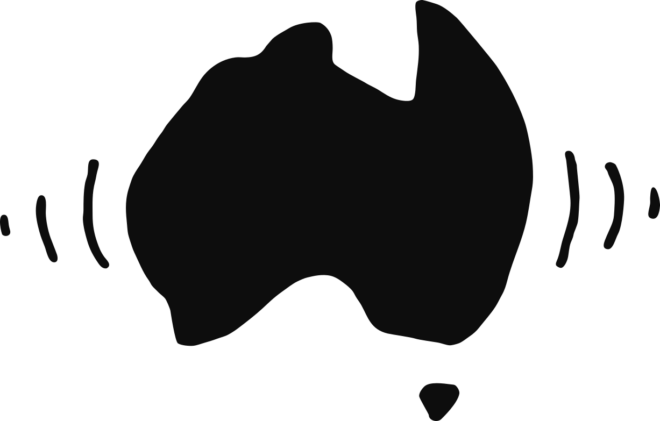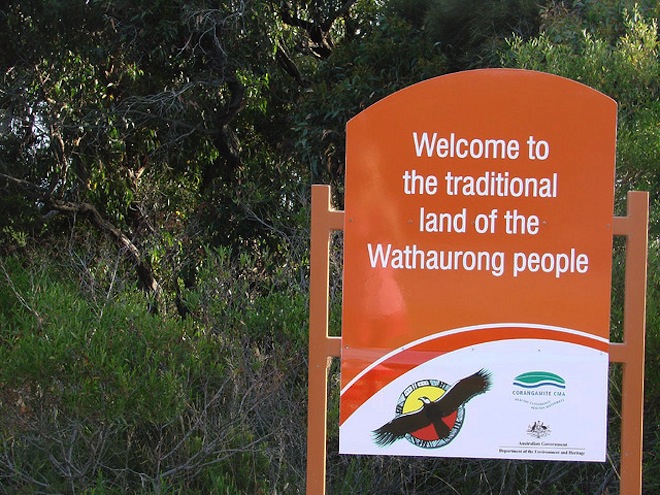Listen to Michael Brydon’s piece: Buckley’s Chance at Truth from #1317 Postcards from Reconciliation.
By Michael Brydon
The story of William Buckley is amazing. But, as with so much of Australian history, only the colonial voice has truly been heard. When a story like Buckley’s defines an entire community, history can become dangerous.
The conventional version of William Buckley’s story tells of the survival and resilience of a white convict in the Australian bush. But there’s so much more to the story, as you’ll hear in the short documentary I created for the Postcards from Reconciliation episode of All the Best.
After Buckley, after the period of settlement, after their people had been decimated by disease, famine and massacre, the Wathaurong began to re-build. They tried to maintain and preserve their culture. But being so few, the fight was tough. They weren’t allowed on white missions and they were shunned by other indigenous groups.
They were in between two cultures, just like Buckley. To this day, they continue to be over-looked by government at all levels, the media and other indigenous Australians.
To begin with, The Wathaurong weren’t formally recognised as an indigenous group by the Victorian government until 2009. And many ‘Welcome to Land’ ceremonies performed on their country continue to be carried out by other clans. This is a very disrespectful act according to Wathaurong law— traditionally those who do so should be speared and driven off country.
Then, in 2010, the ABC commissioned a three-part documentary called The Extraordinary Tale of William Buckley. It was one of the sources I used to research my story. While interviewing Wathaurong chairperson Bryon Powell and cultural heritage officer Sean Fagan I asked them whether they had been contacted for the documentary:
Bryon Powell: “No.”
Me: “Have you ever been contacted in relation to the story of William Buckley?”
Bryon Powell: “No, [All The Best] are the first to ever contact us in relation to that. Even when the ABC did their documentary on William Buckley they talked to Indigenous people from all over Australia that live in Geelong, but not the Wathaurong.”
I was shocked to hear this- as a journalist it seemed obvious that speaking to the ancestors of the indigenous people who had lived with William Buckley for 32 years was crucial to understanding the story.
Another blow to the Wathaurong and their identity took place in 2011. Andrew Bolt, a prominent opinion writer for Melbourne’s Herald Sun, was taken to court by a class action that included Bindi Cole, an Australian photographer and the daughter of Bryon Powell. In an article, Bolt essentially wrote that Cole and the Wathaurong weren’t really Aboriginal because they aren’t black-skinned and that they had claimed the identity for personal and political gain.
Bolt was later found guilty of breaching the Racial Discrimination Act , but that doesn’t mean that Bolt’s opinions aren’t still held within other indigenous and non-indigenous communities. The Wathaurong have faced stigma and prejudice from many directions.
Yet when I met them, I felt Bryon and Sean showed a real sense of resilience. They said that the fights they faced would make things easier for future generations of Wathaurong, and would help preserve their ancient culture.
I think all Australians need to embrace an indigenous perspective in their understanding of our country’s history. Our ancestors did terrible things to the indigenous people of Australia. We have to accept that. It makes things so much worse when we pretend it didn’t happen.
The Wathaurong weren’t as lucky as Buckley. They never had people take them in, and care for them when it looked like they were down and out. But they have survived, and will continue to. Let’s change perceptions, embrace our history and work together towards more meaningful reconciliation.
Next time you hear someone say “You’ve got Buckley’s chance”, stop them. Tell them what you’ve learned about this story. And correct them by telling them a true story of survival against all odds, persecution and suffering. Tell them “You’ve got Wathaurongs’ chance”.
Photo credit: Krawall Maedchen

